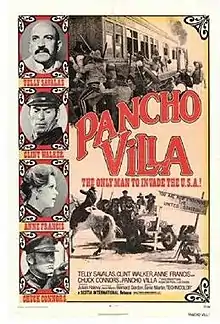Pancho Villa (film)
Pancho Villa is a 1972 American, British and Spanish spaghetti western film directed by Eugenio Martín. The film features Telly Savalas, Clint Walker, Chuck Connors and Anne Francis.[1] Shot in Spain, this "brawling spectacle"[2] has an often-overlooked light-comedy satirical facet, which to this day often confuses viewers. The storyline was developed during the Vietnam War and reflected certain antiwar sentiments in an American society.[3]
| Pancho Villa | |
|---|---|
 Theatrical release poster | |
| Directed by | Eugenio Martín |
| Produced by | Bernard Gordon |
| Screenplay by | Julian Zimet (as Julian Halevy) |
| Story by | Eugenio Martín |
| Starring | Telly Savalas Clint Walker Chuck Connors Anne Francis |
| Music by | Antón García Abril |
| Cinematography | Alejandro Ulloa |
| Edited by | Antonio Ramírez de Loaysa |
Production company | Granada Films Scotia International |
| Distributed by | Scotia International Film Distributors |
Release date |
|
Running time | 92 minutes |
| Country | United States United Kingdom Spain |
| Language | English |
Plot
After being double-crossed in an arms deal by a gun merchant McDermott (Luis Dávila) from Columbus, New Mexico, legendary Mexican revolutionary Pancho Villa (Telly Savalas) and his US lieutenant Scotty (Clint Walker) decide to take a revenge by first raiding a US Army weapons depot in Columbus, and then seizing McDermott. The title song "We All End Up the Same", with music by John Cacavas and lyrics by Don Black, is sung by Telly Savalas.[4]
Cast
- Telly Savalas as Pancho Villa
- Clint Walker as Scotty
- Chuck Connors as Col. Wilcox
- Anne Francis as Flo
- José María Prada as Luis
- Ángel del Pozo as Lt. Eager
- Luis Dávila as McDermott
- Mónica Randall as Lupe
- Antonio Casas as General Goyo
- Alberto Dalbés as Captain Mendoza
- Walter Coy as General Pershing
Production
Producer Bernard Gordon wrote in his autobiography that Telly Savalas and Clint Walker did not get along during the shooting of the movie. Savalas made attempts to upstage Walker and even insisted on changing some two-shots into solo shots.[5] Conversely, Clint Walker enjoyed Anne Francis's companionship, unlike his onscreen character.[6] This was important to Walker, as not much time had passed since he had barely survived a skiing accident, which, as he told Gordon, completely changed his life.[5] Gordon stated that the production was finished on time and on budget despite script problems.
See also
References
- Pancho Villa at IMDb.
- Rodriguez, Clara E. (2004). Heroes, Lovers, and Others: The Story of Latinos in Hollywood. Washington, D.C.: Smithsonian Books. p. 159.
- Rampell, Ed (2005). Progressive Hollywood: A People's Film History of the United States. New York: Disinformation Company. p. 121. ISBN 9781932857108.
- "Record Details". 45cat.com. Retrieved 22 June 2013.
- Gordon, Bernard (1999). Hollywood exile, or, How I learned to love the blacklist: A memoir. Austin: University of Texas Press.
- Wagner, L (2011). Anne Francis: The life and career. Jefferson, N.C.: McFarland.
External links
- Pancho Villa at IMDb
- Pancho Villa at AllMovie
- Pancho Villa film at Hulu
- Pancho Villa at Rotten Tomatoes

- Pancho Villa at the Spaghetti Western Database
- Pancho Villa ending titles on YouTube